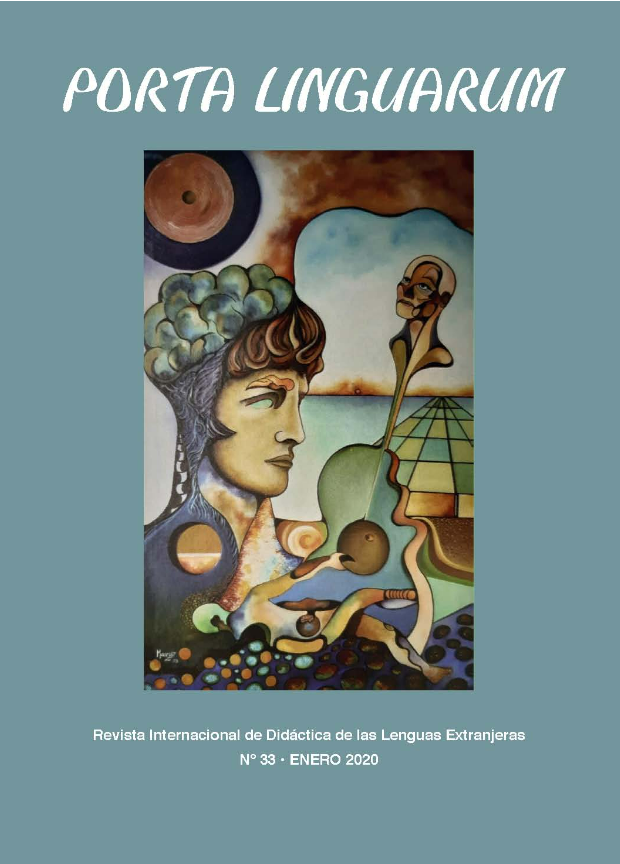Poesía para la clase de inglés: explorando el cambio en la percepción de estudiantes universitarios
DOI:
https://doi.org/10.30827/portalin.vi33.26657Palabras clave:
poesía para la clase de inglés, percepciones de estudiantes, motivación, dimensión intercultural, competencia lingüísticaResumen
Este estudio explora la percepción de estudiantes universitarios en relación al potencial de la poesía como herramienta en la enseñanza del inglés como lengua extranjera antes y después de la impartición de una secuencia didáctica basada en un poema. A tal fin, 132 estudiantes completaron un cuestionario para obtener datos tanto cuantitativos como cualitativos acerca de los beneficios lingüísticos, motivacionales e interculturales que se presupone que la literatura puede aportar a la enseñanza de la lengua extranjera. Los resultados demuestran que, en el pretest, los estudiantes consideran que las lecciones basadas en poemas son más útiles para desarrollar conocimiento lingüístico que ganancias interculturales o motivacionales. En el post-test, sin embargo, los estudiantes asignan una mayor importancia, que resulta estadísticamente significativa, a los componentes interculturales y motivacionales. Este cambio parece apuntar a la naturaleza exclusivamente instrumental de la enseñanza recibida en anteriores estadios de su educación en lengua inglesa.
Descargas
Citas
Baba, W.K. (2008). An investigation into teachers’ and students’ attitudes towards literature and its use in ESL classrooms: A case study at a matriculation centre in Malaysia. (Unpublished Doctoral Dissertation). University of Leicester, Leicester, United Kingdom.
Bobkina, J. & Domínguez, E. (2014). The use of literature and literary texts in the EFL classroom; between consensus and controversy. International Journal of Applied Linguistics & English Literature, 3(2), 248-260.
Bloemert, J., Paran, A., Jansen, E. & van de Grift, W. (2019). Students’ perspective on the benefits of EFL literature education. The Language Learning Journal, 47(3), 371-384.
Bogdan, R.C. & S.K. Biklen. (2003). Qualitative research for education: An introduction to theory and methods. Allyn & Bacon.
Butler, I. (2006). Integrating language and literature in English Studies: A case study of the English 100 course at the university of North West. (Unpublished Doctoral Dissertation). University of South Africa, South Africa.
Byram, M. (2008). From foreign language education to education for intercultural citizenship. Essays and reflections. Multilingual Matters.
Carroli, P. (2008). Literature in second language education: Enhancing the role of texts in learning. Continuum.
Carter, R. (2007). Literature and language teaching 1986-2006: A review. International Journal of Applied Linguistics, 17(1), 3-13.
Çetinavcı, U.R. & Tütüniş, B. (2012). Making use of poems to teach English. The Journal of Language Teaching and Learning, 2(2), 75-88.
Crookes, G. (2013). Critical ELT in action: Foundations, promises, praxis. Routledge.
Duncan, S. & Paran, A. (2017). The effectiveness of literature on acquisition of language skills and intercultural understanding in the high school context. London: Institute of Education. UCL.
Ghazali, S.N., Setia, R., Muthusamy, C. and Jusoff, K. (2009). ESL students’ attitude towards texts and teaching methods used in literature classes. English Language Teaching, 2(4), 51-56.
Hall, G. (2015). Literature in language education. Palgrave.
Hanauer, D.I. (2010). Poetry as Research: Exploring second language poetry writing. John Benjamins.
Hanauer, D.I. (2015). Measuring voice in poetry written by second language learners. Written Communication, 32(1), 66-86.
Harlow, L.L. & Musykens, J. A. (1994). Priorities for intermediate-level language instruction. The Modern Language Journal, 78(2), 141-154.
Hirvela, A. & Boyle, J. (1988). Literature courses and student attitudes. ELT Journal, 42(3), 179-184.
Khatib, M. (2011). A new approach to teaching English poetry to EFL students. Journal of Language Teaching & Research, 2(1), 164-169.
Kramsch, C. (2013). Culture in foreign language teaching. Iranian Journal of Language Teaching Research, 1(1), 57-78.
Lamie, J.M. (2004). Presenting a model of change. Language Teaching Research, 8(2), 15-142.
Lazar, G. (2009). Literature and language teaching: A guide for teachers and trainers. Cambridge: CUP.
Duff, A. & Maley, A. (2007). Literature. Oxford University Press.
McKay, S.L. (2014). Literature as content for ESL/EFL. In M. Celce-Murcia (Ed.) Teaching English as second or foreign language (pp. 319-332). Heinle & Heinle.
Martin, I. (2000). Theoretical, practical and didactic reasons for using contemporary British poetry in the ELT classroom. IATEFL Literature and Cultural Studies, 19, 3-15.
Martin, A.L. & Laurie, I. (1993). Student views about the contribution of literary and cultural content to language learning at intermediate level. Foreign Language Annals, 26(2), 188-207.
Paran, A. (2008). The role of literature in instructed foreign language learning and teaching: An evidence-based survey. Language Teaching, 41(4), 465-496.
Scott, V.M. & Huntington, J.A. (2007). Literature, the interpretive mode, and novice learners. The Modern Language Journal, 91(1), 3-14.
Skela, J. (2014). The quest for literature in EFL textbooks-A quest for Camelot? ELOPE, 11(1), 113-136.
Stefanova, S., Bobkina, J. & Sánchez-Verdejo Pérez, F.J. (2017). The effectiveness of teaching critical thinking skills through literature in EFL context: A case study in Spain. International Journal of Applied Linguistics & English Literature, 6(6), 252-266.
Teranishi, M., Saito, Y. & Wales, K. (Eds.) (2015). Literature and language learning in the EFL classroom. Basingstoke: Palgrave.
Vural, H. (2013). Use of literature to enhance motivation in ELT classes. Mevlana International Journal of Education, 3(4), 15-23.
Waugh, L. (2016). “Why I stayed”. In M. Hassard, G. Langley & S. Nigliazzo (eds.) Red Sky. Poetry on the global epidemic of violence against women (p. 68). Greensboro, NC: Sable Books.
Weist, V. D. (2004). Literature in lower-level courses: making progress in both language and reading skills. Foreign Language Annals, 37(2), 209-221.
Xerri, D. & Xerri Agius, S. (2015). Galvanizing empathy through poetry. English Journal, 104(4), 71-76.
Yeh, A. (2005). Poetry from the heart. English Today, 21(1), 45-51.



















